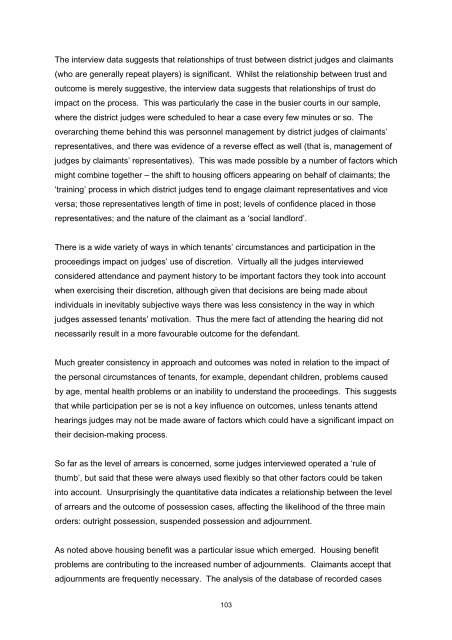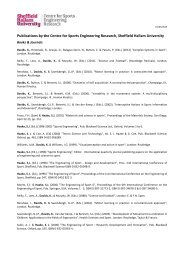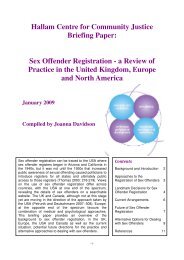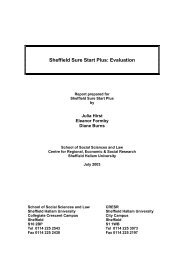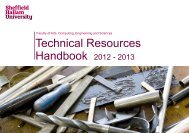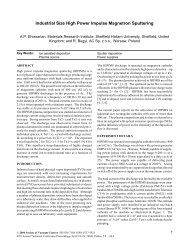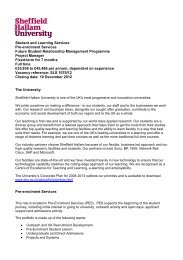The exercise of judicial discretion in rent arrears cases - Sheffield ...
The exercise of judicial discretion in rent arrears cases - Sheffield ...
The exercise of judicial discretion in rent arrears cases - Sheffield ...
Create successful ePaper yourself
Turn your PDF publications into a flip-book with our unique Google optimized e-Paper software.
<strong>The</strong> <strong>in</strong>terview data suggests that relationships <strong>of</strong> trust between district judges and claimants<br />
(who are generally repeat players) is significant. Whilst the relationship between trust and<br />
outcome is merely suggestive, the <strong>in</strong>terview data suggests that relationships <strong>of</strong> trust do<br />
impact on the process. This was particularly the case <strong>in</strong> the busier courts <strong>in</strong> our sample,<br />
where the district judges were scheduled to hear a case every few m<strong>in</strong>utes or so. <strong>The</strong><br />
overarch<strong>in</strong>g theme beh<strong>in</strong>d this was personnel management by district judges <strong>of</strong> claimants’<br />
representatives, and there was evidence <strong>of</strong> a reverse effect as well (that is, management <strong>of</strong><br />
judges by claimants’ representatives). This was made possible by a number <strong>of</strong> factors which<br />
might comb<strong>in</strong>e together – the shift to hous<strong>in</strong>g <strong>of</strong>ficers appear<strong>in</strong>g on behalf <strong>of</strong> claimants; the<br />
‘tra<strong>in</strong><strong>in</strong>g’ process <strong>in</strong> which district judges tend to engage claimant representatives and vice<br />
versa; those representatives length <strong>of</strong> time <strong>in</strong> post; levels <strong>of</strong> confidence placed <strong>in</strong> those<br />
representatives; and the nature <strong>of</strong> the claimant as a ‘social landlord’.<br />
<strong>The</strong>re is a wide variety <strong>of</strong> ways <strong>in</strong> which tenants’ circumstances and participation <strong>in</strong> the<br />
proceed<strong>in</strong>gs impact on judges’ use <strong>of</strong> <strong>discretion</strong>. Virtually all the judges <strong>in</strong>terviewed<br />
considered attendance and payment history to be important factors they took <strong>in</strong>to account<br />
when exercis<strong>in</strong>g their <strong>discretion</strong>, although given that decisions are be<strong>in</strong>g made about<br />
<strong>in</strong>dividuals <strong>in</strong> <strong>in</strong>evitably subjective ways there was less consistency <strong>in</strong> the way <strong>in</strong> which<br />
judges assessed tenants’ motivation. Thus the mere fact <strong>of</strong> attend<strong>in</strong>g the hear<strong>in</strong>g did not<br />
necessarily result <strong>in</strong> a more favourable outcome for the defendant.<br />
Much greater consistency <strong>in</strong> approach and outcomes was noted <strong>in</strong> relation to the impact <strong>of</strong><br />
the personal circumstances <strong>of</strong> tenants, for example, dependant children, problems caused<br />
by age, mental health problems or an <strong>in</strong>ability to understand the proceed<strong>in</strong>gs. This suggests<br />
that while participation per se is not a key <strong>in</strong>fluence on outcomes, unless tenants attend<br />
hear<strong>in</strong>gs judges may not be made aware <strong>of</strong> factors which could have a significant impact on<br />
their decision-mak<strong>in</strong>g process.<br />
So far as the level <strong>of</strong> <strong>arrears</strong> is concerned, some judges <strong>in</strong>terviewed operated a ‘rule <strong>of</strong><br />
thumb’, but said that these were always used flexibly so that other factors could be taken<br />
<strong>in</strong>to account. Unsurpris<strong>in</strong>gly the quantitative data <strong>in</strong>dicates a relationship between the level<br />
<strong>of</strong> <strong>arrears</strong> and the outcome <strong>of</strong> possession <strong>cases</strong>, affect<strong>in</strong>g the likelihood <strong>of</strong> the three ma<strong>in</strong><br />
orders: outright possession, suspended possession and adjournment.<br />
As noted above hous<strong>in</strong>g benefit was a particular issue which emerged. Hous<strong>in</strong>g benefit<br />
problems are contribut<strong>in</strong>g to the <strong>in</strong>creased number <strong>of</strong> adjournments. Claimants accept that<br />
adjournments are frequently necessary. <strong>The</strong> analysis <strong>of</strong> the database <strong>of</strong> recorded <strong>cases</strong><br />
103


